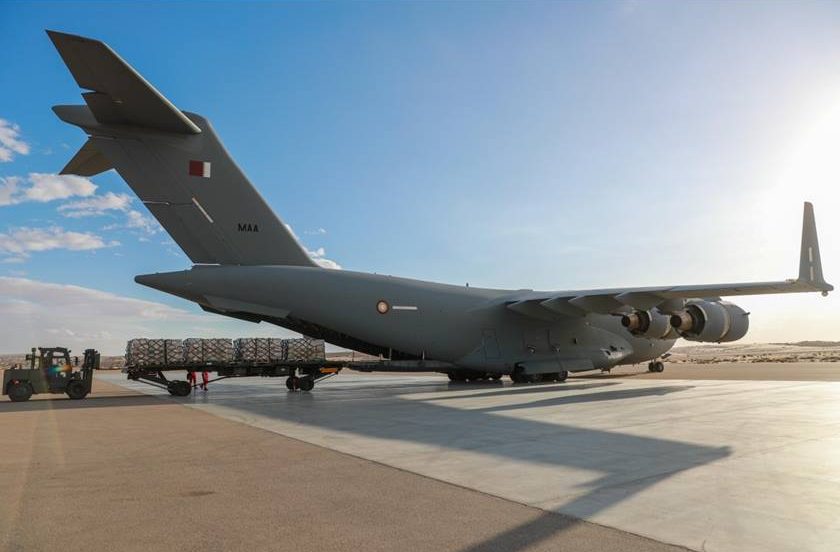The war, coupled with Israel’s complete blockade on Gaza, led to a catastrophic humanitarian situation and unbearable living conditions.
A Qatar Armed Forces aircraft carrying 26 tonnes of aid for Gaza landed in Egypt’s El Arish city on Wednesday as part of the Gulf country’s efforts to help alleviate the suffering of the Strip’s 2.2 million population under Israel’s genocidal war.
The aid flight contained essentials provided by the Qatar Fund for Development and Qatar Charity, the Gulf state’s foreign ministry said in a statement.
The latest flight brought up the number of aid aircraft dispatched by Qatar since last year to 93.
“The aid came within the framework of the State of Qatar’s unwavering support for the Palestinian brothers and its full support for them during the challenging humanitarian conditions currently facing them,” the statement added.
Last year, Qatar’s Amir Sheikh Tamim bin Hamad Al-Thani launched an initiative to sponsor 3,000 orphans and treat 1,500 injured Palestinians from the Strip. Qatar has evacuated more than 1,500 people from Gaza.
Qatar evacuated the 22nd batch of wounded Palestinians on April 8.
The vital aid and Qatari humanitarian efforts in Gaza come amid Israel’s relentless war that has killed nearly 34,000 people while displacing more than 80 percent of the population.
Gaza’s authorities and independent watchdogs believe the death toll is much higher as thousands of bodies remain trapped under the rubble — especially as authorities keep uncovering more corpses in different areas after being cleared by occupation forces.
Last week, reporters on the ground found several decomposed bodies inside the Al-Shifa Medical Complex after Israel’s two-week raid on the facility before it burned it down.
Al-Shifa once stood as Gaza’s biggest medical facility and one of the most important hospitals in the entirety of Palestine.
Weaponising starvation
The war, coupled with Israel’s complete blockade on Gaza, led to a catastrophic humanitarian situation and unbearable living conditions.
Israel destroyed at least 60 percent of Gaza’s residential units, 80 percent of its commercial buildings, and 155 health facilities, according to the United Nations’ flash update on Wednesday.
The cost of damage to Gaza’s infrastructure during the first four months of the war is estimated at $18.5 billion, according to a recent report by the World Bank and the UN.
“As of the end of January 2024, direct damage of around $18.5 billion has been inflicted on the built infrastructure of Gaza, equivalent to 97 percent of the total Gross Domestic Product of the West Bank and Gaza in 2022,” the report said earlier this month.
Housing units account for 72 percent of the damage costs, or $13.3 billion, whereas public service, energy, and water facilities have suffered nearly $800 million in damages.
Beyond the destruction and displacement, Israel has been widely slammed for weaponising starvation by blocking the entry of life-saving aid and maintaining the blockade on Gaza.
A report by Euro-Med Monitor on April 4 uncovered what it described as “Israel’s deliberate policy to reinforce famine in Gaza.”
The report analysed the countless massacres committed against aid-seekers and providers in Gaza between January and March.
The first such incident came to the global spotlight on January 11, when Israel targeted civilians waiting for aid at the Kuwait Roundabout, in southeast Gaza.
Within the same reporting period, Euro-Med found that Israel killed at least 563 Palestinians and injured 1,523 others while they were waiting for aid at distribution centres.
“The use of starvation as a weapon has been an official political decision from the first day of the war, as declared by the Israeli Minister of Defence, and was implemented in integrated stages,” the rights group said.
At least 28 children in Gaza died as a result of dehydration and malnutrition, according to the UN’s latest flash update.
Aid has been stacking up for months in neighbouring Egypt awaiting Israel’s approval to enter Gaza. Some of the aid already expired by the time it reached the people in the besieged enclave.
Less than 200 trucks have been entering Gaza on a daily basis and do not contain fuel due to Israel’s restrictions on the type of aid that enters. The total number of trucks is significantly less than the pre-war daily average of 500 through the Rafah Crossing alone.
Israeli settlers have also been holding regular protests to prevent the entry of aid trucks into Gaza through the Karem Abu Salem crossing.







